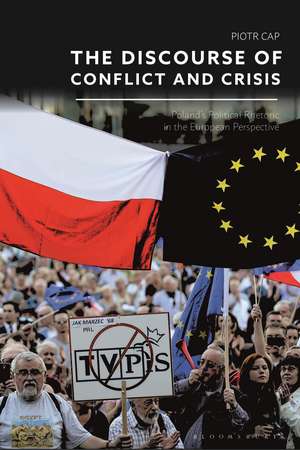The Discourse of Conflict and Crisis: Poland’s Political Rhetoric in the European Perspective
Autor Dr Piotr Capen Limba Engleză Paperback – 17 mai 2023
| Toate formatele și edițiile | Preț | Express |
|---|---|---|
| Paperback (1) | 189.99 lei 43-57 zile | |
| Bloomsbury Publishing – 17 mai 2023 | 189.99 lei 43-57 zile | |
| Hardback (1) | 596.88 lei 43-57 zile | |
| Bloomsbury Publishing – 17 noi 2021 | 596.88 lei 43-57 zile |
Preț: 189.99 lei
Preț vechi: 248.62 lei
-24% Nou
Puncte Express: 285
Preț estimativ în valută:
36.37€ • 39.51$ • 30.57£
36.37€ • 39.51$ • 30.57£
Carte tipărită la comandă
Livrare economică 21 aprilie-05 mai
Preluare comenzi: 021 569.72.76
Specificații
ISBN-13: 9781350270268
ISBN-10: 1350270261
Pagini: 184
Dimensiuni: 156 x 234 x 25 mm
Greutate: 0.27 kg
Editura: Bloomsbury Publishing
Colecția Bloomsbury Academic
Locul publicării:London, United Kingdom
ISBN-10: 1350270261
Pagini: 184
Dimensiuni: 156 x 234 x 25 mm
Greutate: 0.27 kg
Editura: Bloomsbury Publishing
Colecția Bloomsbury Academic
Locul publicării:London, United Kingdom
Caracteristici
Links Polish political discourse to right-wing developments in other European countries, with discursive examples from Hungary, Romania, Bulgaria, Austria, Italy and the UK
Notă biografică
Piotr Cap is Professor of Linguistics at the University of Lódz, Poland.
Cuprins
List of Figures and TablesIntroduction1. 'Do What I Say, Unless.': Political Leadership, Coercion, and Threat Construction2. Polish Contexts: Threat-Based Communication and Crisis Management in Communist and Post-Communist Poland3. Enemy at Home: 'Total Opposition', 'Post-Communist Elites' and 'Keepers of the Round Table Order'4. The 'Worst Sort of Poles' Narrative5. European Union and the Discourse of National Sovereignty6. Oppressed by Neighbors: Germany, Russia, and Nord Stream 2Concluding RemarksNotesBibliographyIndex
Recenzii
A well-documented study ... The main contribution of Cap's book lies in expanding the intersections between cognitive linguistics and discourse studies by showing how language uses can be weaponized by powerful political actors and explaining the pragma-linguistic operations that result in certain power-legitimizing construals of reality.
Piotr Cap's lucid account is indispensable for English-speakers seeking to understand the workings of national populism, and not only in the form that it has taken in Poland and eastern Europe. Taking full account of national particularities, including Britain's Brexit, it provides an unusually rich analysis of national-populist text and talk, applying up-to-date methods from the language sciences.
Piotr Cap's lucid account is indispensable for English-speakers seeking to understand the workings of national populism, and not only in the form that it has taken in Poland and eastern Europe. Taking full account of national particularities, including Britain's Brexit, it provides an unusually rich analysis of national-populist text and talk, applying up-to-date methods from the language sciences.
